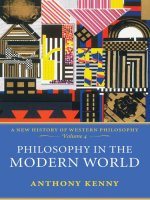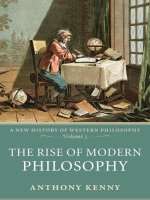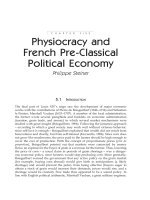The oxford history of historical writing volume 5 historical writing since 1945
Bạn đang xem bản rút gọn của tài liệu. Xem và tải ngay bản đầy đủ của tài liệu tại đây (4.97 MB, 741 trang )
Tai Lieu Chat Luong
THE OXFORD HISTORY OF
HISTORICAL WRITING
THE OXFORD HISTORY OF HISTORICAL WRITING
The Oxford History of Historical Writing is a five-volume, multi-authored scholarly
survey of the history of historical writing across the globe. It is a chronological
history of humanity’s attempts to conserve, recover, and narrate its past with
considerable attention paid to different global traditions and their points of
comparison with Western historiography. Each volume covers a particular period,
with care taken to avoid unduly privileging Western notions of periodization, and
the volumes cover progressively shorter chronological spans, reflecting both the
greater geographical range of later volumes and the steep increase in historical
activity around the world since the nineteenth century. The Oxford History of
Historical Writing is the first collective scholarly survey of the history of historical
writing to cover the globe across such a substantial breadth of time.
Volume
Volume
Volume
Volume
Volume
1: Beginnings to ad 600
2: 400–1400
3: 1400–1800
4: 1800–1945
5: Historical Writing since 1945
THE OXFORD HISTORY OF HISTORICAL WRITING
Daniel Woolf
GENERAL EDITOR
The Oxford History of
Historical Writing
VOLUME
5:
HISTORICAL WRITING SINCE
Axel Schneider and Daniel Woolf
VOLUME EDITORS
Ian Hesketh
ASSISTANT EDITOR
1
1945
3
Great Clarendon Street, Oxford ox2 6dp
Oxford University Press is a department of the University of Oxford.
It furthers the University’s objective of excellence in research, scholarship,
and education by publishing worldwide in
Oxford New York
Auckland Cape Town Dar es Salaam Hong Kong Karachi
Kuala Lumpur Madrid Melbourne Mexico City Nairobi
New Delhi Shanghai Taipei Toronto
With offices in
Argentina Austria Brazil Chile Czech Republic France Greece
Guatemala Hungary Italy Japan Poland Portugal Singapore
South Korea Switzerland Thailand Turkey Ukraine Vietnam
Oxford is a registered trade mark of Oxford University Press
in the UK and in certain other countries
Published in the United States
by Oxford University Press Inc., New York
# Oxford University Press 2011
Editorial matter # Axel Schneider and Daniel Woolf 2011
The moral rights of the authors have been asserted
Database right Oxford University Press (maker)
First published 2011
All rights reserved. No part of this publication may be reproduced,
stored in a retrieval system, or transmitted, in any form or by any means,
without the prior permission in writing of Oxford University Press,
or as expressly permitted by law, or under terms agreed with the appropriate
reprographics rights organization. Enquiries concerning reproduction
outside the scope of the above should be sent to the Rights Department,
Oxford University Press, at the address above
You must not circulate this book in any other binding or cover
and you must impose the same condition on any acquirer
British Library Cataloguing in Publication Data
Data available
Library of Congress Cataloging in Publication Data
Data available
Typeset by SPI Publisher Services, Pondicherry, India
Printed in Great Britain
on acid-free paper by
MPG Books Group, Bodmin and King’s Lynn
ISBN 978–0–19–922599–6
1 3 5 7 9 10 8 6 4 2
The Oxford History of Historical Writing was made possible
by the generous financial support provided by the Offices of
the Vice-President (Research) and the Provost and Vice-President
(Academic) at the University of Alberta from 2005 to 2009 and
subsequently by Queen’s University, Kingston, Ontario.
General Editor’s Acknowledgements
The Oxford History of Historical Writing has itself been the product of several
years of work and many hands and voices. As general editor, it is my pleasure to
acknowledge a number of these here. First and foremost are the volume editors,
without whom there would have been no series. I am very grateful for their
willingness to sign on, and for their flexibility in pursuing their own vision for
their piece of the story while acknowledging the need for some common goals
and unity of editorial practices. The Advisory Board, many of whose members
were subsequently roped into either editorship or authorship, have given freely of
their time and wisdom. At Oxford University Press, former commissioning
editor Ruth Parr encouraged the series proposal and marshalled it through the
readership and approvals process. After her departure, my colleagues and
I enjoyed able help and support from Christopher Wheeler at the managerial
level and, editorially, from Rupert Cousens, Seth Cayley, Matthew Cotton, and
Stephanie Ireland. I must also thank the OUP production team and Carol
Bestley in particular.
The series would not have been possible without the considerable financial
support from the two institutions I worked at over the project’s lifespan. At the
University of Alberta, where I worked from 2002 to mid-2009, the project
was generously funded by the Offices of the Vice-President (Research) and
the Provost and Vice-President (Academic). I am especially grateful to Gary
Kachanoski and Carl Amrhein, the incumbents in those offices, who saw the
project’s potential. The funding they provided enabled the project to hire a series
of project assistants, to involve graduate students in the work, and to defray some
of the costs of publication such as images and maps. It permitted the acquisition
of computer equipment and also of a significant number of books to supplement
the fine library resources at Alberta. Perhaps most importantly, it also made the
crucial Edmonton conference happen. At Queen’s University in Kingston,
Ontario, where I moved into a senior leadership role in 2009, funding was
provided to push the project over the ‘finish-line’, to transfer the research library,
and in particular to retain the services for two years of an outstanding research
associate: Assistant Editor Dr Ian Hesketh. I am profoundly grateful for Ian’s
meticulous attention to detail, and his ability ruthlessly to cut through excess
prose (including on occasion my own) in order to ensure that volumes maintained editorial uniformity internally and together with other volumes, not least
because the volumes are not all being published at once. A series of able graduate
students have served as project assistants, including especially Tanya Henderson,
General Editor’s Acknowledgements
vii
Matthew Neufeld, Carolyn Salomons, Tereasa Maillie, and Sarah Waurechen,
the last of whom almost single-handedly organized the complex logistics of the
Edmonton conference. Among the others on whom the project has depended
I have to thank the Office of the Dean of Arts and Science for providing project
space at Queen’s University, and the Department of History and Classics at
Alberta. Melanie Marvin at Alberta and Christine Berga at Queen’s have assisted
in the management of the research accounts, as has Julie Gordon-Woolf, my
spouse (and herself a former research administrator), whose advice on this front is
only a small part of the support she has provided.
This page intentionally left blank
Foreword
Daniel Woolf, General Editor
Half a century ago, Oxford University Press published a series of volumes
entitled Historical Writing on the Peoples of Asia. Consisting of four volumes
devoted to East Asia, Southeast Asia, the Middle East, and South Asia, and based
on conferences held at the School of Oriental and African Studies, University of
London in the late 1950s, that series has aged surprisingly well; many of the
individual essays are still being cited in our own day. The books were also
remarkably ahead of their time, since the history of historical writing was at
that time firmly understood as being the history of a European genre. Indeed, the
subject of the history of history was itself barely a subject—typical surveys of the
early to mid-twentieth century by the likes of James Westfall Thompson and
Harry Elmer Barnes, following Eduard Fueter’s paradigmatic 1911 Geschichte der
Neuren Historiographie, were written by master historians surveying their discipline and its origins. The Oxford series provided some much needed perspective,
though it was not followed up for many years, and more recent surveys in the last
two or three decades of the twentieth century have continued to speak of
historiography as if it were an entirely Western invention or practice. Since the
late 1990s a number of works have been published that challenge the Eurocentrism of the history of history, as well as its inherent teleology. We can now view
the European historiographic venture against the larger canvas of many parallel
and—a fact often overlooked—interconnected traditions of writing or speaking
about the past from Asia, the Americas, and Africa.
The Oxford History of Historical Writing is conceived in this spirit. It seeks to
provide the first collective scholarly history of historical writing to span the globe.
It salutes its great predecessor of half a century ago, but very deliberately seeks
neither to imitate nor to replace it. For one thing, the five volumes collectively
include Europe, the Americas, and Africa, together with Asia; for another, the
division among these volumes is chronological, rather than regional. We decided
on the former because the history of non-European historical writing should, no
more than that of its European counterpart, be viewed in isolation. We chose the
latter in order to provide what amounts to a cumulative narrative (albeit with
well over a hundred different voices), and in order to facilitate comparison and
contrast between regions within a broad time period.
A few caveats that apply to the entire series are in order. First, while the series
as a whole will describe historical writing from earliest times to the present, each
x
Foreword
individual volume is also intended to stand on its own as a study of a particular
period in the history of historical writing. These periods shrink in duration as
they approach the present, both because of the obvious increase in extant
materials and known authors, but also because of the expansion of subject matter
to a fully global reach (the Americas, for instance, feature not at all in volume 1;
non-Muslim Africa appears in neither volume 1 nor volume 2). Second, while the
volumes share a common goal and are the product of several years of dialogue
both within and between its five editorial teams and the general editor, there has
been no attempt to impose a common organizational structure on each volume.
In fact, quite the opposite course has been pursued: individual editorial teams
have been selected because of complementary expertise, and encouraged to ‘go
their own way’ in selecting topics and envisioning the shapes of their volumes—
with the sole overriding provision that each volume had to be global in ambition.
Third, and perhaps most importantly, this series is emphatically neither an
encyclopedia nor a dictionary. A multi-volume work that attempted to deal
with every national tradition (much less mention every historian) would easily
spread from five to fifty volumes, and in fact not accomplish the ends that the
editors seek. We have had to be selective, not comprehensive, and while every
effort has been made to balance coverage and provide representation from all
regions of the world, there are undeniable gaps. The reader who wishes to find
out something about a particular country or topic not included in the OHHW ’s
more than 150 chapters can search elsewhere, in particular in a number of
reference books which have appeared in the past fifteen or so years, some of
which have global range. Our volumes are of course indexed, but we have
deemed a cumulative index an inefficient and redundant use of space. Similarly,
each individual essay offers a highly selective bibliography, intended to point the
way to further reading (and where appropriate listing key sources from the period
or topic under discussion in that chapter). In order to assist readers with limited
knowledge of particular regions’ or nations’ political and social contexts, certain
chapters have included a timeline of major events, though this has not been
deemed necessary in every case. While there are (with one or two exceptions) no
essays devoted to a single ‘great historian’, many historians from Sima Qian and
Herodotus to the present are mentioned; rather than eat up space in essays with
dates of birth and death, these have been consolidated in each volume’s index.
Despite the independence of each team, some common standards are of course
necessary in any series that aims for coherence, if not uniformity. Towards that
end, a number of steps were built into the process of producing this series from
the very beginning. Maximum advantage was taken of the Internet: not only
were scholars encouraged to communicate with one another within and across
volumes, but draft essays were posted on the project’s website for commentary
and review by other authors. A climactic conference, convened at the University
of Alberta in Edmonton, Canada in September 2008, brought most of the
editors and just over half the authors together, physically, for an energizing and
Foreword
xi
exciting two days during which matters of editorial detail and also content and
substance were discussed. A major ‘value-added’, we think, of both conference
and series, is that it has introduced to one another scholars who normally work in
separate national and chronological fields, in order to pursue a common interest
in the history of historical writing in unique and unprecedented ways. As the
series’ general editor, it is my hope that these connections will survive the end of
the project and produce further collaborative work in the future.
Several key decisions came out of the Edmonton conference, among the most
important of which was to permit chronological overlap, while avoiding unnecessary repetition of topics. The chronological divisions of the volumes—with
calendrical years used instead of typical Western periods like ‘Middle Ages’ and
‘Renaissance’—remain somewhat arbitrary. Thus volume 1, on antiquity, ends
about ad 600, prior to the advent of Islam, but overlaps with its successor,
volume 2, on what in the West were the late antique and medieval centuries, and
in China (the other major tradition of historical writing that features in every
volume), the period from the Tang through the early Ming dynasties. Volumes 4
and 5 have a similar overlap in the years around the Second World War. While
1945 is a sensible boundary for some subjects, it is much less useful for others—in
China, again, 1949 is the major watershed. Certain topics, such as the Annales
School, are not usefully split at 1945. A further change pertained to the denotation
of years bc and ad; here, we reversed an early decision to use bce and ce on the
grounds that both are equally Eurocentric forms; bc/ad have at least been
adopted by international practice, notwithstanding their Christian European
origins.
It became rather apparent in Edmonton that we were in fact dealing with two
sets of two volumes each (vols. 1/2 and 4/5), with volume 3 serving in some ways
as a bridge between them, straddling the centuries from about 1400 to about
1800—what in the West is usually considered the ‘early modern’ era. A further
decision, in order to keep the volumes reasonably affordable, was to use illustrations very selectively, and only where a substantive reason for their inclusion
could be advanced, for instance in dealing with Latin American pictographic
forms of commemorating the past. There are no decorative portraits of famous
historians, and that too is appropriate in a project that eschews the history of
historiography conceived of as a parade of stars—whether Western or Eastern,
Northern or Southern—from Thucydides to Toynbee.
In volume 5, the second-published of the series but its concluding volume
chronologically, my co-editor, Axel Schneider, and I have had to deal with a tiny
fraction of the time covered in other volumes, but also a period of unprecedented
change—which has not yet abated. We decided at the planning stage that the
volume should have two sorts of chapters, one thematic and the other nationalregional. This, in essence, meant that many countries and parts of the world
would go unrepresented, but the series as a whole, as noted above, has never
intended comprehensive coverage. Moreover, while historiography is still in
xii
Foreword
many ways organized by national fields, in the past sixty years the most interesting changes have crossed and re-crossed spatial lines—at an accelerated pace in
the electronic/virtual era of the past ten to fifteen years—such that many
important developments would have fallen between geopolitical cracks in a
book arranged exclusively along national lines. Thus our volume begins with a
series of thematic chapters reflecting on history’s relations with its neighbours as
well as with a selection of the differing approaches, methodologies, and subdisciplines which have emerged in the past sixty-five years. These developments,
however, have played out in practice within the institutions and cultures of
particular countries and regions, and have been affected by variable political
and social circumstances. The second half of the book therefore traces the
working-out in practice of some of the themes opened up in the first half within
national, and in some cases transnational, contexts.
NOTE ON TRANSLATION AND TRANSLITERATION
Non-Roman alphabets and writing systems have been routinely transliterated
using the standard systems for each language (for instance, Chinese using the
Pinyin system). Non-English book titles are normally followed (except where
meaning is obvious) by a translated title, within square brackets, and in roman
rather than italic face, unless a specific, published English translation is listed, in
which case the bracketed title will also be in italics.
Contents
List of Maps
Notes on the Contributors
Advisory Board
Editors’ Introduction
Axel Schneider and Daniel Woolf
1. History and Theory
Chris Lorenz
2. History and Memory
Alon Confino
3. Censorship and History since 1945
Antoon De Baets
4. Postcolonial Criticism and History: Subaltern Studies
Gyan Prakash
5. World History
Juărgen Osterhammel
6. Global Economic History: A Survey
Peer Vries
7. Women’s and Gender History
Julie Des Jardins
8. The Historiography of Environmental History
J. R. McNeill
9. The Historiography of Science and Technology
Seymour Mauskopf and Alex Roland
10. History and Social Science in the West
Kevin Passmore
11. From the Search for Normality to the Search for Normality:
German Historical Writing
Stefan Berger
12. Historical Writing in Poland, Czechoslovakia, and Hungary
Maciej Go´rny
13. French Historical Writing
Matthias Middell
xvi
xvii
xxi
1
13
36
52
74
93
113
136
159
177
199
220
243
266
xiv
Contents
14. British Historical Writing
Michael Bentley
15. Scandinavian Historical Writing
Rolf Torstendahl
16. Italian Historical Writing
Stuart Woolf
17. Historical Writing in the Balkans
Ulf Brunnbauer
18. Athens and Apocalypse: Writing History in Soviet Russia
Denis Kozlov
19. African Historical Writing
Toyin Falola
20. Argentine Historical Writing in an Era of Political and Economic
Instability
Joel Horowitz
21. Brazilian Historical Writing
Marshall C. Eakin
22. Mexican Historical Writing
Guillermo Zermen˜o Padilla
23. Historical Writing in the United States
Ian Tyrrell
24. Arab Historical Writing
Youssef M. Choueiri
25. Indian Historical Writing since 1947
Supriya Mukherjee
26. Thai Historical Writing
Patrick Jory
27. Vietnamese Historical Writing
Patricia Pelley
28. Indonesian Historical Writing after Independence
Ann Kumar
29. Settler Histories and Indigenous Pasts: New Zealand and Australia
Bain Attwood
30. Chinese Historical Writing since 1949
Susanne Weigelin-Schwiedrzik
31. Japanese Historical Writing
Sebastian Conrad
291
311
333
353
375
399
422
440
454
473
496
515
539
559
575
594
615
637
Contents
32. Historians and Historical Writing in Modern Korea
Henry Em
Epilogue: On the Current and Future State of Historical Writing
Allan Megill
Index
xv
659
678
689
List of Maps
1. Post-War Western Europe
2. Eastern Europe during the Cold War
3. The Chronology of African Independence
4. Latin America and the Caribbean
5. North America
6. Contemporary South Asia
7. Contemporary Southeast Asia
269
354
400
425
474
516
540
Notes on the Contributors
Bain Attwood is Professor of History at Monash University in Melbourne, Australia. His
publications include Rights for Aborigines (2003), Telling the Truth about Aboriginal
History (2005), and Possession: Batman’s Treaty and the Matter of History (2009).
Michael Bentley is Professor of Modern History at the University of St Andrews and
currently a Leverhulme Major Research Fellow working on a comparative study of
Western historiography. He is well known for his Companion to Historiography (1997)
and Modern Historiography (1999).
Stefan Berger is Professor of Modern German and Comparative European History at the
University of Manchester, UK, where he is also Director of the Manchester Jean-MonnetCentre of Excellence. His latest monograph is Friendly Enemies: Britain and the GDR,
1949–1990 (2010).
Ulf Brunnbauer (Ph.D., University of Graz) is Chair of History of Southeast and East
European History at the University of Regensburg, and Director of the Institute for
Southeast European studies, Regensburg. He was director of the international research
project ‘Post-Socialist Historiography in Southeast Europe’ (2001–3), and is editor of the
collection (Re)Writing History: Historiography in Southeast Europe after Socialism (2004).
Youssef M. Choueiri is Reader in Islamic Studies at the University of Manchester. His
publications include Islamic Fundamentalism (2003), Arab Nationalism (2001), and the
Blackwell Companion to the History of the Middle East (2005).
Alon Confino is Professor of History at the University of Virginia. Among his previous
publications is Germany as a Culture of Remembrance: Promises and Limits of Writing
History (2006). His book, Foundational Pasts : An Essay in Holocaust Interpretation will be
published in 2011 and he is now completing a book entitled A World without Jews: Nazi
Germany, Representations of the Past, and the Holocaust.
Sebastian Conrad is Professor of History at the Free University of Berlin, Germany.
Among his recent publications are The Quest for the Lost Nation: Writing History in
Germany and Japan in the American Century (2010), and Globalisation and the Nation in
Imperial Germany (2010).
Antoon De Baets is an historian working at the University of Groningen, the Netherlands.
His books include Censorship of Historical Thought: A World Guide, 1945–2000 (2002), and
Responsible History (2009). He coordinates the Network of Concerned Historians and is
preparing a History of the Censorship of History (1945–2010).
Julie Des Jardins teaches history at Baruch College, City University of New York. She
has written Women and the Historical Enterprise in America: Gender, Race and the Politics
of Memory (2003), and The Madame Curie Complex: The Hidden History of Women in
Science (2010).
xviii
Notes on the Contributors
Marshall C. Eakin is Professor of History at Vanderbilt University and the Executive
Director of the Brazilian Studies Association. Among his previous publications are The History
of Latin America: Collision of Cultures (2007) and Brazil: The Once and Future Country (1997).
Henry Em is Associate Professor of East Asian Studies at New York University. His
book Sovereignty and Selfhood in Modern Korean Historiography is forthcoming from
Duke University Press. Among his previous publications, in Korean, is the co-edited
Ku˘ndaeso˘ng u˘i yo˘kso˘l [Entangled Modernities] (2009).
Toyin Falola is the Frances Higginbothom Nalle Centennial Professor in History and
University Distinguished Teaching Professor, the University of Texas at Austin. His latest
book is Colonialism and Violence in Nigeria (2009).
Maciej Go´rny is Assistant Professor at the Institute of History of the Polish Academy of
Sciences in Warsaw, Poland. Among his previous publications are Mie˛dzy Marksem a
Palacky´m: Historiografia w komunistycznej Czechosłowacji (2001), and Przede wszystkim ma
byc´ naro´d: Marksistowskie historiografie w Europie S´rodkowo-Wschodniej (2007).
Joel Horowitz is Professor of History at St. Bonaventure University, St. Bonaventure,
NY. His most recent book is Argentina’s Radical Party and Popular Mobilization,
1916–1930 (2008).
Patrick Jory is Senior Lecturer in Southeast Asian History at the University of Queensland. He is co-editor, with Michael Montesano, of Thai South and Malay North: Ethnic
Interactions on a Plural Peninsula (2008).
Denis Kozlov is an Assistant Professor of Russian history at Dalhousie University. He has
published a number of articles on Soviet intellectual history and is completing a monograph tentatively titled ‘The Readers of Novyi mir, 1945–1970: Twentieth-Century
Experience and Soviet Historical Consciousness’.
Ann Kumar is a Professor at the Australian National University. Most of her publications
pertain to Indonesian political, social, and intellectual history from the fifteenth to the
twentieth century. Her recent book, Globalizing the Prehistory of Japan: Language, Genes
and Civilization, however, explores early Javanese influence on Japan’s first civilization.
Chris Lorenz is Professor in the Theory of History and Historiography at the VU
University Amsterdam. Recent publications include Przekraczanie Granic: Esejez filozofii
historii i teorii historiografii (Poznan 2009); (co-editor, with Stefan Berger), The Contested
Nation: Ethnicity, Class, Religion and Gender in National Histories (Houndmills, 2008);
Nationalizing the Past: Historians as Nation Builders in Modern Europe (Houndmills,
2010); (co-editor, with Stefan Berger and Billie Melman), Popularizing National Pasts:
From 1800 to the Present (New York, 2011).
J. R. McNeill is Professor of History and University Professor at Georgetown University.
His books include Mosquito Empires: Ecology and War in the Greater Caribbean, 1620–1914
(2010), The Human Web (2003), and Something New Under the Sun (2000).
Seymour Mauskopf received his Ph.D. from Princeton University in the history of
science. His previous publications include Crystals and Compounds (1976), Chemical
Sciences in the Modern World (1993), and, with Michael R. McVaugh, The Elusive Science
Notes on the Contributors
xix
(1980). Currently, he is working on a book on Alfred Nobel’s interactions with British
munitions scientists in the late nineteenth century.
Allan Megill is Professor of History at the University of Virginia. He is the author
of Historical Knowledge, Historical Error: A Contemporary Guide to Practice (2007), and of
Karl Marx: The Burden of Reason (2002), among other works.
Matthias Middell is Professor and Director of the Global and European Studies Institute
at the University of Leipzig, Germany. Among other books he has published a history of
world history-writing in Germany from Lamprecht to the end of the twentieth century
(2005).
Supriya Mukherjee is an instructor at the University of Memphis. She has contributed
chapters on Indian historical writing in A Global History of Modern Historiography (2008).
Juărgen Osterhammel is Professor of Modern and Contemporary History at the University
of Konstanz, Germany. Among his previous publications are Geschichtswissenschaft jenseits
des Nationalstaats (2001), and Die Verwandlung der Welt: Eine Geschichte des neunzehnten
Jahrhunderts (2009).
Kevin Passmore is Reader in History at Cardiff University, Wales. His publications
include the edited books Europe since 1900: Writing National Histories (1999), and Writing
History: Theory and Practice (2nd edn, 2010)
Patricia Pelley is Associate Professor of History at Texas Tech University. She is the
author of Postcolonial Vietnam: New Histories of the National Past (2002).
Gyan Prakash is Dayton-Stockton Professor of History at Princeton University. His
publications include Bounded Histories: Genealogies of Labor Servitude in Colonial India
(1990), and Another Reason: Science and the Imagination of Modern India (1999). His new
book Mumbai Fables was published in 2010.
Alex Roland is Professor of History at Duke University. His previous publications
include The Military-Industrial Complex (2001), Strategic Computing (2002), and The
Way of the Ship (2008).
Axel Schneider is Professor of Modern China Studies at Goăttingen University, Germany.
Among his previous publications is Truth and History: Two Chinese Historians in Search of a
Modern Identity for China (1997; Chinese version in 2008).
Rolf Torstendahl is Emeritus Professor at Uppsala University, Uppsala, Sweden. Among
his publications are An Assessment of Twentieth-Century Historiography (2000) and HistoryMaking: The Intellectual and Social Formation of a Discipline (1996).
Ian Tyrrell is Scientia Professor of History at the University of New South Wales,
Sydney, Australia, and the author of Historians in Public: The Practice of American History,
1890–1970 (Chicago, 2005).
Peer Vries is Professor of Global Economic History at the University of Vienna. He has
published widely in the field of comparative economic history of the early modern era. He
is now finishing a book on the political economy of Britain and China in that period that
will be published by Brill Publishers.
xx
Notes on the Contributors
Susanne Weigelin-Schwiedrzik is Professor of Chinese Studies at the University of
Vienna, Austria. She has published several books and articles on twentieth-century
Chinese historiography, especially on post-1949 Chinese historiography.
Daniel Woolf is Professor of History at Queen’s University in Kingston, Canada. Among
his previous publications are A Global Encyclopedia of Historical Writing (1998), and The
Social Circulation of the Past (2003). He has also written A Global History of History (2011).
Stuart Woolf was Professor of Contemporary History at the University of Venice (Italy)
and previous to that was Professor of History at Essex and the European University
Institute. He retired in 2006. Among his books are A History of Italy 1700–1860: The Social
Constraints of Political Change (1979), and Napoleon’s Integration of Europe (1991).
Guillermo Zermen˜o Padilla is Professor of History at El Colegio de Me´xico in Mexico
City, Mexico. Among his recent publications are La cultura moderna de la historia: una
aproximacio´n teo´rica e historiogra´fica (Mexico, 2002), and (co-editor) Diccionario polı´tico y
social del mundo iberoamericano: la era de las revoluciones, 1750–1850 (Madrid, 2009).
Advisory Board
Michael Aung-Thwin, University of Hawaii
Michael Bentley, University of St Andrews
Peter Burke, University of Cambridge
Toyin Falola, University of Texas
Georg G. Iggers, SUNY Buffalo
Donald R. Kelley, Rutgers University
Tarif Khalidi, American University, Beirut
Christina Kraus, Yale University
Chris Lorenz, VU University Amsterdam
Stuart Macintyre, University of Melbourne
Juărgen Osterhammel, Universitat Konstanz
Ilaria Porciani, University of Bologna
Joărn Ruăsen, Kulturwissenschaftliches Institut, Essen
Romila Thapar, Jawaharlal Nehru University, Delhi
This page intentionally left blank
Editors’ Introduction
Axel Schneider and Daniel Woolf
This concluding volume in The Oxford History of Historical Writing covers a very
small period in comparison with some of its companions: barely two-thirds of a
century. As with the other volumes, the boundary dates are both fluid and
imprecise: 1945 is a watershed date for the world in the sense that it marked
the end of the Second World War and the division of Europe into a Western and
an Eastern bloc. Elsewhere in the world, other dates are more meaningful: for
China, 1949 is the critical year; and in much of Africa the decolonization of the
1950s and 1960s marked a significant rupture with past, colonial historiography.
Unlike the earlier volumes, our period is also an unfinished one, for though some
obvious sub-periods are broken at points such as the early 1960s, the fall of
European communism at the end of the 1980s, and the rapid rise of both
globalization and radical Islam during the 1990s, it is difficult to predict, in
early 2010 as this introduction is written, just where the story of post-war
historiography will end, or how. What is apparent is that the progressive fissuring
and refissuring of the historical field along multiple fault lines is likely to
continue, as party, race, gender, religion, ethnicity, class, and ideology continue
to vie for dominance, all now further complicated by postmodern doubts about
the very possibility of historical knowledge beyond the filter of language.
Although our chronological brief is a short one, the period is enormously
complicated in ways that make it different from its predecessors. In particular,
the highly nationalist orientation of much nineteenth-century historical writing
(and the organization of the institutions of history such as universities, archives,
professional journals, and major source publication initiatives), which continued
through the early twentieth century, began to break down in the West at the end
of the war. In other parts of the globe, however, nationalist historiography has
continuously remained strong, and it has experienced a recent resurgence in
post–Cold War Europe. It is perhaps more accurate to say that nationalist modes
of historical writing were challenged after 1945 by other modes of organizing and
structuring the study of the past, along thematic, problem-based, or ideological
and interest-group lines. Not coincidentally, this is also the period within this
global history of historical writing during which history itself became more
2
The Oxford History of Historical Writing
seriously and consistently global, beginning with the ‘world history’ initiatives of
the 1960s and 1970s (here treated by Juărgen Osterhammel), and ending, as we go
to press, in a doubling back of this global imperative into historiography itself.
The book and the series are themselves products of a resurgent globalism which
began at the end of the last millennium, and of a desire to treat the history of the
discipline within an international and, where appropriate (it is not always),
comparative framework.
In a volume of some 300,000 words it is of course impossible to include every
aspect of historical writing. Nor would it be in keeping with the series as a whole,
which has aimed to be representative rather than comprehensive, and which
eschews any claim to an encyclopaedic coverage. As suggested in the general
editor’s foreword, we have opted to slice our smallish portion of the series’
chronological cake in two different ways. In the first half of the work, primacy
is given to theoretical and problem-based historiography. Authors have been
encouraged to approach chapters in this section with a global reach, but we have
ourselves realized in the course of producing the book that some theoretical issues
are not global, and even when they are, have unfolded in widely different ways.
Postmodernism, for instance, while not exclusively a fixation of the West, is very
vibrant in East Asia, but there it has been utilized less as an epistemological
critique of history or a subversion of its categories than as a tool to emphasize, for
instance, a particularity that sets itself apart from the West/Rest. Postmodernism
has thus become in some parts of the world a tool to fortify boundaries, rather
than to tear them down.
Having ‘set the table’, so to speak, the second half of the volume returns to a
more conventional national—or regional—approach. One might question why
it is still appropriate to use this kind of categorization in an era of ‘postnationalism’. The obvious rationale is that there are still in most countries (including
some newly emerging from a Cold War internationalism or, at the other end of
the spectrum, liberated from dictatorships and military juntas, as is the case in
parts of Latin America) strong traces of the nineteenth century’s scholarly
structures, journals, and professional associations, and university history departments continue to hire academics predominantly by national and chronological
categories. The second reason, however, is more important: it is in the Petri
dish of particular countries that we can watch historical cultures develop, as
the individual cells of national historiographic enterprises come into contact
with differing theoretical approaches and preoccupations. Or, to change the
metaphor, if we are to study the real-life implications of historiographic
trends—feminism and gender, memory studies, environmental history, socialscience-based history, and so on—national and regional case studies offer a series
of windows.
The modern discipline of history has never been a unified field. Ever since the
beginnings of institutionalized academic history-writing in mid-nineteenth-century
Europe (a theme of the forthcoming OHHW vol. 4), divergent understandings of









